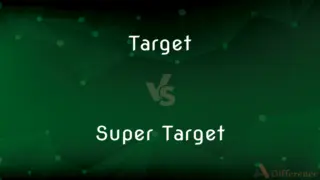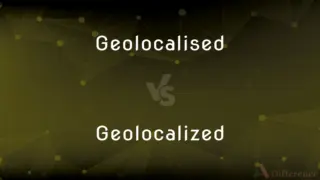Antenna vs. Transmitter — What's the Difference?
By Tayyaba Rehman — Updated on October 27, 2023
An antenna receives and emits radio waves, while a transmitter generates and sends signals. The antenna propagates signals; the transmitter produces them.

Difference Between Antenna and Transmitter
Table of Contents
ADVERTISEMENT
Key Differences
Antenna and Transmitter are crucial components in wireless communication systems. An antenna is a device designed to radiate or receive electromagnetic waves, translating them into electrical currents and vice versa. On the other hand, a transmitter is an electronic device that produces and modulates signals, preparing them for broadcast.
Antenna and Transmitter have distinct but complementary roles. While the primary function of an antenna is to radiate the signals into space or to capture them, a transmitter generates these signals. In a broadcasting setup, it is the transmitter that formulates the message to be communicated, and the antenna disseminates it.
Considering the Antenna and Transmitter in a radio station: the transmitter would take an audio signal, amplify and modulate it, converting it into a radio frequency (RF) signal. The antenna would then radiate this RF signal as electromagnetic waves into the atmosphere.
Antenna and Transmitter rely on each other to complete the communication process. Without a functioning transmitter, an antenna would have no signal to propagate. Conversely, without an appropriate antenna, a transmitter's signal would not efficiently reach its intended audience.
Lastly, both Antenna and Transmitter contribute to the quality of signal reception. A high-quality transmitter ensures the generation of clear signals, while an optimal antenna ensures that these signals reach the receiver without significant loss or distortion.
ADVERTISEMENT
Comparison Chart
Function
Radiates and receives electromagnetic waves.
Produces and modulates signals for broadcast.
Physical Appearance
Often elongated or dish-shaped structures.
Typically a box-like or handheld electronic device.
Energy
Doesn't generate energy but can focus it.
Consumes energy to produce signals.
Interaction with Signals
Deals directly with electromagnetic waves.
Works with the electronic form of the signal.
Dependency
Relies on a transmitter for signals to radiate.
Needs an antenna to effectively broadcast its signal.
Compare with Definitions
Antenna
A structure that receives and emits radio waves.
The car's antenna picked up the radio signal from miles away.
Transmitter
A device generating and sending signals for broadcast.
The transmitter sent out a strong signal for the radio show.
Antenna
A device converting electrical signals into electromagnetic waves and vice versa.
She adjusted the TV antenna for better reception.
Transmitter
The origin of signals in a wireless setup.
Without the transmitter, the communication link would be incomplete.
Antenna
(Zoology) One of the paired, flexible, segmented sensory appendages on the head of an insect, myriapod, or crustacean functioning primarily as an organ of touch.
Transmitter
An apparatus converting information into signals for transmission.
The TV station's transmitter broke down, disrupting the broadcast.
Antenna
Something likened to this sensory appendage, as in function or form
Sensitive public relations antennae.
Transmitter
An electronic unit producing and modulating signals.
Engineers were busy repairing the transmitter at the base station.
Antenna
A structure in a photosynthetic organism containing pigment molecules that absorb light energy and transfer it to a reaction center composed of proteins and pigments, where the light energy is converted into chemical energy.
Transmitter
In electronics and telecommunications a transmitter or radio transmitter is an electronic device which produces radio waves with an antenna. The transmitter itself generates a radio frequency alternating current, which is applied to the antenna.
Antenna
Pl. an·ten·nas A metallic apparatus for sending or receiving electromagnetic waves such as radio waves.
Transmitter
One that transmits
A transmitter of disease.
Antenna
A feeler organ on the head of an insect, crab, or other animal. 17
Transmitter
An electronic device that generates and amplifies a carrier wave, modulates it with a meaningful signal derived from speech or other sources, and radiates the resulting signal from an antenna.
Antenna
An apparatus to receive or transmit electromagnetic waves and convert respectively to or from an electrical signal.
Transmitter
The portion of a telephone that converts the incident sounds into electrical impulses that are conveyed to a remote receiver.
Antenna
(figurative) The faculty of intuitive astuteness.
Transmitter
A telegraphic sending instrument.
Antenna
(biochemistry) A fragment of an oligosaccharide
Transmitter
A neurotransmitter.
Antenna
(nautical) The spar to which a lateen sail is attached, which is then hoisted up the mast.
Transmitter
One who or that which transmits something (in all senses).
Antenna
A movable, articulated organ of sensation, attached to the heads of insects and Crustacea. There are two in the former, and usually four in the latter. They are used as organs of touch, and in some species of Crustacea the cavity of the ear is situated near the basal joint. In insects, they are popularly called horns, and also feelers. The term in also applied to similar organs on the heads of other arthropods and of annelids.
Transmitter
An electronic device that generates and amplifies a carrier wave, modulates it with a meaningful signal derived from speech, music, TV or other sources, and broadcasts the resulting signal from an antenna.
Antenna
A metallic device, variously shaped, designed for the purpose of either transmitting or receiving radio waves, as for radio or television broadcasting, or for transmitting communication signals. Some types are: whip antenna, antenna tower, horn antenna, dish antenna, directional antenna and rabbit ears. See transmitter, receiver.
Transmitter
One who, or that which, transmits; specifically, that portion of a telegraphic or telephonic instrument by means of which a message is sent; - opposed to receiver.
Antenna
An electrical device that sends or receives radio or television signals
Transmitter
Someone who transmits a message;
Return to sender
Antenna
Sensitivity similar to that of a receptor organ;
He had a special antenna for public relations
Transmitter
Any agent (person or animal or microorganism) that carries and transmits a disease;
Mosquitos are vectors of malaria and yellow fever
Fleas are vectors of the plague
Aphids are transmitters of plant diseases
When medical scientists talk about vectors they are usually talking about insects
Antenna
One of a pair of mobile appendages on the head of e.g. insects and crustaceans; typically sensitive to touch and taste
Transmitter
Set used to broadcast radio or tv signals
Antenna
A metallic apparatus for sending or receiving electromagnetic waves.
The tall antenna tower dominated the city's skyline.
Transmitter
A source of electromagnetic waves in a communication system.
The radio transmitter has a range of several miles.
Antenna
A means to capture and propagate signals in a wireless system.
Without a good antenna, the radio won't work properly.
Antenna
An elongated sensory appendage in insects and crustaceans.
The bug's antenna twitched as it sensed danger nearby.
Common Curiosities
What is an antenna's primary function?
An antenna's primary function is to radiate and receive electromagnetic waves.
What does a transmitter do?
A transmitter produces and modulates signals, preparing them for broadcast.
Why are some antennas very large?
Larger antennas can offer better gain and directivity, making them more effective at capturing or radiating weak signals.
Are antennas specific to certain frequencies?
Yes, antennas are often designed for specific frequency bands to optimize performance.
What powers a transmitter?
Transmitters are powered by electrical sources, often using amplifiers to boost signal strength.
What materials are antennas typically made of?
Antennas are usually made of conductive materials, most commonly metals like copper or aluminum.
Does a transmitter always require an antenna?
For effective broadcasting, a transmitter typically requires an antenna.
How does a transmitter modulate signals?
A transmitter modulates signals by varying their amplitude, frequency, or phase based on the information being sent.
How does a transmitter connect to an antenna?
Transmitters connect to antennas using coaxial cables or other transmission lines.
Can an antenna work without a transmitter?
An antenna needs a transmitter to provide the signals it radiates.
Can the location of an antenna affect reception?
Yes, the location, orientation, and surrounding environment can significantly impact an antenna's reception.
What happens if a transmitter overheats?
Overheating can cause a transmitter to malfunction or even sustain permanent damage.
Do all devices with wireless capabilities have antennas and transmitters?
Yes, any device that communicates wirelessly requires both an antenna and a transmitter.
Is the range of a transmitter limited?
Yes, a transmitter's range can be limited by its power, frequency, and external interferences.
Can multiple antennas be used together?
Yes, multiple antennas can be used in arrays to improve signal strength and directivity.
Share Your Discovery

Previous Comparison
Once vs. Ones
Next Comparison
Tenement vs. FlatAuthor Spotlight
Written by
Tayyaba RehmanTayyaba Rehman is a distinguished writer, currently serving as a primary contributor to askdifference.com. As a researcher in semantics and etymology, Tayyaba's passion for the complexity of languages and their distinctions has found a perfect home on the platform. Tayyaba delves into the intricacies of language, distinguishing between commonly confused words and phrases, thereby providing clarity for readers worldwide.














































